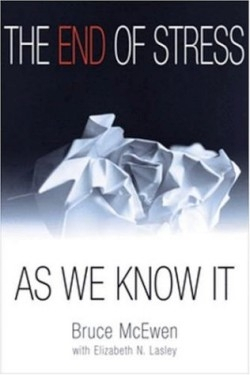The End of Stress As We Know It
This book offers an encouraging affirmation that combating stress is literally a function of “mind over matter.” Contrary to some notions that stress is something external to the body, the author maintains that “stress begins in the brain” and is the effect of the body’s overreaction to external stimuli—and can be kept under control.
Many books on stress deal with the behavioral aspects of dealing with stressful situations. McEwen, a professor at Rockefeller University and head of the Hatch Laboratory of Neuroendocrinology in New York, presents a scientific perspective on the physiological causes and effects of stress. The technical nature and content may appeal more to people in the medical field, but the subject matter and writing are basic enough to be of interest to anyone interested in how to reduce stress.
The book is an outgrowth of McEwen’s research findings and renowned career in scientific research in the field of stress and health. Its basic premise is that “the brain’s perception of stress brings about changes in the body that are inarguably real.” It explains allostasis, or the integration of the brain, endocrine, and immune systems in response to a fight-or-flight situation. McEwen suggests that illnesses like heart disease, ulcers, and diabetes can be triggered when a natural allostatic response is activated too frequently and becomes an allostatic load, which can strain the heart, damage the immune system, and trigger other illnesses. “Chronic stress takes its toll most immediately on the heart,” he writes. It can lead to sudden escalations in blood pressure, which can result in heart attacks in clogged blood vessels.
The effects of stress on the immune system are also well documented and the book cites several research studies supporting this point. Many other studies, from the early 1900s until the current time, are referenced to support the idea that stress is produced within the body and can be controlled to varying degrees by adopting a healthy lifestyle.
Armed with this knowledge, the author promotes using the awareness of the connection between allostatic load and illnesses to help diagnose and treat conditions such as depression and alcoholism. The astute reader or medical professional could derive some benefit from this book to understand and begin a plan of action toward appropriate treatment and a healthier life.
Reviewed by
Cindy Patuszynski
Disclosure: This article is not an endorsement, but a review. The publisher of this book provided free copies of the book to have their book reviewed by a professional reviewer. No fee was paid by the publisher for this review. Foreword Reviews only recommends books that we love. Foreword Magazine, Inc. is disclosing this in accordance with the Federal Trade Commission’s 16 CFR, Part 255.

